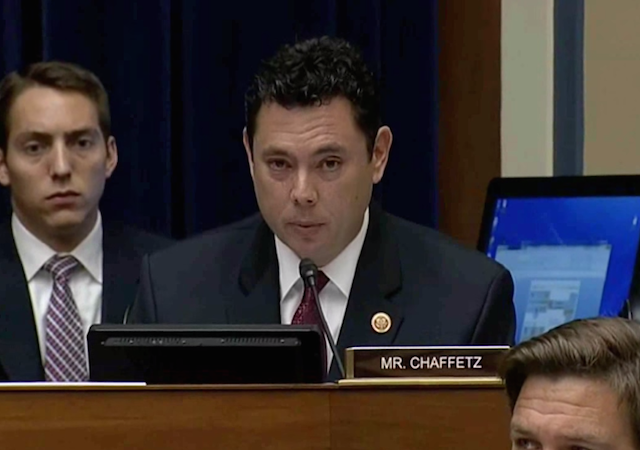House Unanimously Passes Bill to Protect FBI Whistleblowers
It’s about time these people received proper protection.

On Tuesday, the House of Representatives unanimously passed a bill introduced by Rep. Jason Chaffetz (R-UT) that protects FBI whistleblowers. Chaffetz said:
“While a great many changes remain to be made in how DOJ and the FBI respond to whistleblowers, this commonsense clarification is not minor. If implemented, it would have far-reaching implications in protecting whistleblowers at the FBI, just as Congress intended in 1978 in the first whistleblower protection law.”
Case after case has shown the FBI did not not protect its whistleblowers as well as other departments. Whistleblowers often faced retaliation and threatening emails. A few even lost their jobs all because they wanted to expose wrong doings in their divisions.
Chaffetz decided Congress ought to protect whistleblowers and introduced the bill so they “are not retaliated against by supervisors.” I think the biggest part of the bill hands over all complaints to the Inspector General, who will investigate the claims instead of the internal unit.
Former FBI agent John Parkinson and his attorneys “filed a brief to the U.S. Federal Circuit Court of Appeals arguing for his right to raise a whistleblower retaliation defense” after he reported unsavory behaviors about his coworkers in the FBI’s Sacramento office ten years ago. Parkinson stated that after he filed these complaints he “found himself the subject of what he says was a retaliatory investigation, and was eventually fired.” From The Intercept:
After his complaint was filed, Parkinson’s boss removed him from his leadership position and gave him poor performance reviews, sending him to a different field office — actions he interpreted as retaliation. He reported those concerns in a letter to Rep. Chuck Grassley, R-Iowa, who forwarded it to the Department of Justice’s inspector general.
When the DOJ inspector general interviewed Parkinson in 2009, he thought it was about his whistleblower complaint; instead they questioned him about his own conduct, without mentioning he was the target of an investigation. The colleagues he reported for abuse had, in turn, claimed Parkinson misused funds on a construction project during his time in Sacramento, according to his attorney.
The FBI later claimed he obstructed the investigation into the alleged misuse of funds by communicating with witnesses, and that he “lacked candor” in his responses concerning those allegations.
In 2012, he was fired for those offenses.
In March 2015, the FBI emailed a potential whistleblower about retaliation he would face if he came forward “with concerns about political meddling inside a secret terrorism and counterintelligence surveillance program.” The Washington Times reported:
“The main question would turn on the reasonableness of your belief; that is, would a reasonable person, in your situation, believe that the conduct at issue demonstrated mismanagement or abuse of authority?” the FBI attorney, within the Office of Integrity and Compliance, wrote in an email responding to the whistleblower’s inquiry. “In my opinion, yes.”
Then came the kicker: “I’m sure you know, though, this does not guarantee that you will not be retaliated against, even though retaliation/reprisal for making protected disclosures is illegal,” the attorney concluded in the August email to the whistleblower.
The Government Accountability Office (GAO) found that the FBI only has nine officials “to receive whistleblower complaints.” The FBI tried to change the whistleblower program, but many FBI agents have not found much change. The agent who wanted to report about the meddling actually has a superb history within the FBI, but that changed in 2014 over one question:
But after he questioned management in 2014 as to why his division was passed over for a new surveillance team it had earned in the rankings, the whistleblower was given a first-ever negative evaluation. “I’ve been retaliated against just for asking a fair question,” he told The Times.
His performance review, dated September 2014 — a month after he went to the FBI’s legal team seeking whistleblower advice — was downgraded to “minimally successful,” with the primary justification being he was spending too much time trying to call out mismanagement rather than concentrating on the job at hand.
“[Name of whistleblower] advised he had consulted with a law firm and was going to pursue legal action,” his superior wrote in his September review, obtained by The Times. “I advised him he was free to do so, but all research and related activity must be on his own time, and his time was to be spent leading the team.”
Just a year earlier, however, the whistleblower received an “excellent” performance review, even notching off a few “outstanding” marks — the highest rank — in some categories.
 DONATE
DONATE
Donations tax deductible
to the full extent allowed by law.








Comments
Unanimous? I guarantee that if Hillary had won, not one single dem would have voted for this act and they would have been crying that the dem administration is the most transparent ever, that there have been no scandals for the last 8 years and this was completely unnecessary.
I guess everybody is on board to go after Comey.
Please expound upon the bill the GOP House passed with Dem support and no committee or floor debate that would fund the DOJ to track people with “disabilities”
https://www.conservativereview.com/commentary/2016/12/the-gop-house-just-approved-tracking-devices-for-people-with-disabilities
Speaker Ryan…WTF? Big Brother would be proud…
They really needed to do that for ATF agents. Take a look at CUATF, (clean up atf) where Fast and Furious first came to light.
Highly corrupt leadership, an agency that needs to be dissolved without transferring employees. Fire all the management.
Anytime the legislature votes to make something illegal which is already illegal, one must consider just *why*
The FBI is already forbidden to do what it’s been doing with whistleblowers. Making it double-plus ungood isn’t going to help. In fact, it may make it worse, as bad agents who are in the process of being gotten rid of may decide to go into full-fledged lying mode in order to get a softer parachute for their eventual removal.